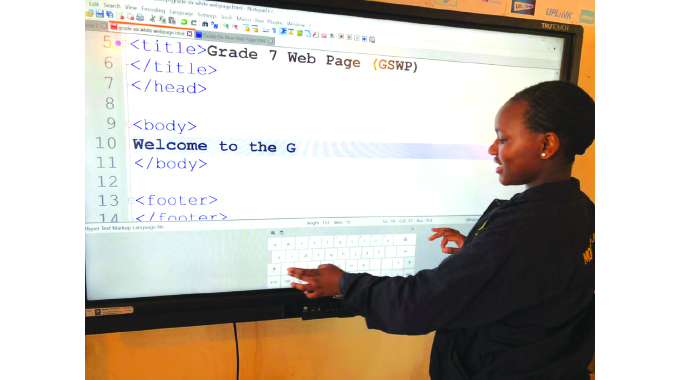Smartboards achieving paperless education at local schools

Shepherd Chimururi
Youth Interactive Correspondent
The need to infuse ICT in all subjects to enhance students’ learning experience and provide them with a better viewing experience is the motivation behind digitalisation of education at some of the local schools through installation of the smartboards.
The use of smartboards and tablets in class from ECD level up to A Level has reinvented the technologically conscious school as a centre of e-learning excellence.
After all, no student wants to stare at a static and unresponsive black board when you have an 80 -nch interactive smartboard screen where information can be viewed, edited and presented.
As it is in the name “smartboard,” the board is clean and smart.
There is no dirt and splashes of colour from white board markers or dust from chalks.
The I-board allows students to view HD videos and audios which can be seen and heard throughout the whole class there by catering both audio and visual learners.
It is a setup which is ready to go with no more time consuming errands like searching for board erasers and markers.
The trending e-board is also a vehicle of hybrid education as it also allows online classes in cases when the teachers are not around.
In an interview with the Youth Interactive, Anopa Mwerenga (12) Grade 7 student from Mother Touch Group Schools, explained how they use smartboards in their class.
“We use smart boards as a computer and they help us in interactive learning. For example, if we are doing VPA, we can draw the stove and other notes on the white screen. We can also use the computer part for researching information for our CALA. We can navigate onto the internet and this can also be used for revision.
“We can download past exam papers and revise them. In our ICT lesson we can also demonstrate what we would have been explaining to each other, for example the topic for photo editing we can open a photo editing software and demonstrate editing a picture,” she said.
She said some of the advantages of a smartboard are that it stores many textbooks and it reduces the burden of carrying textbooks around.
“The best of it is it does not get lost and it does not get torn like a textbook, it can store a lot of information, it is easier as concepts can be demonstrated through videos or researching than reading, it is also exciting to use and it also allows us to expand our knowledge on computers,” said Anopa.
Kusota College students concurred also saying that “Smartboards” work as computers and they help us in interactive learning.
“We use the white screen part for working out our math problems. We can use the windows part to edit our documents.
“During our agriculture lesson we can go on to the internet and download information on various types of tools. Smartboards are also used as desktops but are a big screen. We can also watch our educational videos. They have replaced the chalkboard so we don’t have to worry about chalk dust. They can be used for communication with people around the world. We can also download soft copies of textbooks and other educational material from the internet. It is easier to watch concepts through a video on the smart board than reading from the textbook,” they said.
“Nowadays books can be downloaded online and be viewed for the whole class. Other than sharing textbooks in some scenarios. The in-built board gives a better feeling of writing on the board which can give more confidence. Presentations are easier as you can show the people what you are talking about other than oral lessons.”
Students at the high school are hailing the smartboards over textbooks as Tatenda Musarurwa, upper six sciences student explained.
“We are using the smartboards for research purposes when connected to wi-fi. Our teachers use them to show videos/tutorials on science subjects, elaborate concepts much faster as we can see experiments taking place rather than reading the experiment in a textbook.
P”reference now is on smartboards because textbooks do not show any animations and have limited information. Some textbooks are outdated whereas smart boards can be used to research current information,” she said.
Tanaka Mhlanga, chipped in, “Smartboard at our school are supporting the go green environmental initiative. Books destroy forests and pollute the environment”
For the digitalisation project to succeed some schools have partnered with two key players in the e- learning industry namely Future Store who installed and maintains the boards and maintenance and Dzidzo Inhaka E-learning which chipped in with e-learning software installation and teacher digital compliance training.









Comments